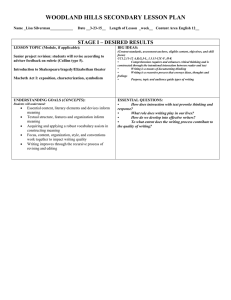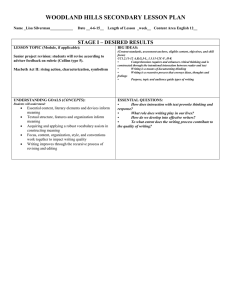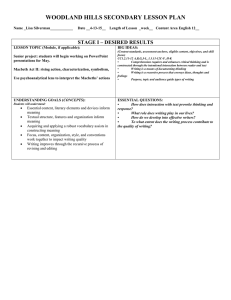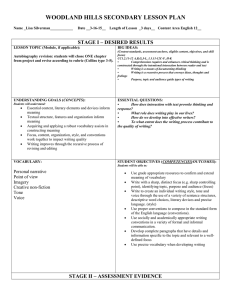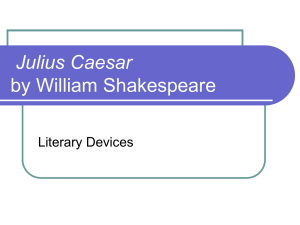WOODLAND HILLS SECONDARY LESSON PLAN
advertisement
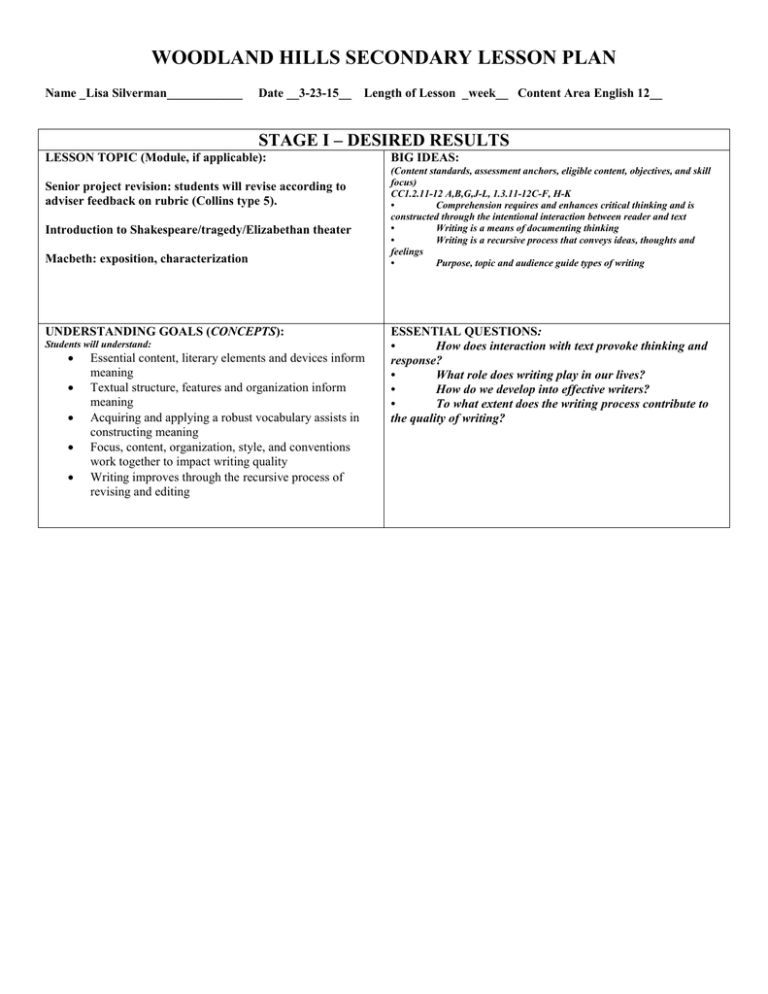
WOODLAND HILLS SECONDARY LESSON PLAN Name _Lisa Silverman____________ Date __3-23-15__ Length of Lesson _week__ Content Area English 12__ STAGE I – DESIRED RESULTS LESSON TOPIC (Module, if applicable): Senior project revision: students will revise according to adviser feedback on rubric (Collins type 5). Introduction to Shakespeare/tragedy/Elizabethan theater Macbeth: exposition, characterization UNDERSTANDING GOALS (CONCEPTS): Students will understand: Essential content, literary elements and devices inform meaning Textual structure, features and organization inform meaning Acquiring and applying a robust vocabulary assists in constructing meaning Focus, content, organization, style, and conventions work together to impact writing quality Writing improves through the recursive process of revising and editing BIG IDEAS: (Content standards, assessment anchors, eligible content, objectives, and skill focus) CC1.2.11-12 A,B,G,J-L, 1.3.11-12C-F, H-K • Comprehension requires and enhances critical thinking and is constructed through the intentional interaction between reader and text • Writing is a means of documenting thinking • Writing is a recursive process that conveys ideas, thoughts and feelings • Purpose, topic and audience guide types of writing ESSENTIAL QUESTIONS: • How does interaction with text provoke thinking and response? • What role does writing play in our lives? • How do we develop into effective writers? • To what extent does the writing process contribute to the quality of writing? VOCABULARY: STUDENT OBJECTIVES (COMPETENCIES/OUTCOMES): Students will be able to: tragedy dramatic conventions—soliloquy, aside iambic pentameter blank verse light/dark symbolism Use grade appropriate resources to confirm and extend meaning of vocabulary Write with a sharp, distinct focus (e.g. sharp controlling point), identifying topic, purpose and audience (focus) Write to create an individual writing style, tone and voice through the use of a variety of sentence structures, descriptive word choices, literary devices and precise language. (style) Use proper conventions to compose in the standard form of the English language (conventions). Use socially and academically appropriate writing conventions in a variety of formal and informal communication. Develop complete paragraphs that have details and information specific to the topic and relevant to a welldefined focus Use precise vocabulary when developing writing Identify and evaluate essential content between and among various text types Use and cite evidence from texts to make assertions, inferences, generalizations, and to draw conclusion Evaluate the effectiveness of the author’s use of literary devices in various genre Analyze and evaluate author’s/authors’ use of literary elements within and among genres Analyze and evaluate author’s/authors’ use of conflict, theme and /or point of view within and among texts Summarize, draw conclusions, and make generalizations from a variety of mediums Develop new and unique insights based on extended understanding derived from critical examinations of text(s) Analyze the impact of societal and cultural influences in texts (Renaissance thinking/culture/Elizabethan theater) Evaluate the characteristics of various genre (e.g. fiction and nonfiction forms of narrative, poetry, drama and essay) to determine how the form relates to purpose. Evaluate organizational features of text (e.g. sequence, question/answer, comparison/contrast, cause/effect, problem/solution) as related to content to clarify and enhance meaning Articulate connections between and among words based on meaning, content, and context to distinguish nuances or connotations Analyze the context of literal, figurative, and idiomatic vocabulary to clarify meaning STAGE II – ASSESSMENT EVIDENCE PERFORMANCE TASK: Writers workshop style classroom with students working at individual paces. Revise senior project first draft. FORMATIVE ASSESSMENTS: Spot check for comprehension Whole class response Instructor mini-conferencing as students write STAGE III: LEARNING PLAN INSTRUCTIONAL PROCEDURES: Do Now: Women’s History Month quotes (Collins type 1) Mini Lesson: Intro to Shakespeare/Macbeth video Guided Practice: Students will work on writings in class with teacher input. Read Macbeth in class and discuss symbolism/characterization Independent Practice: Students will revise essays. Students will take notes on Shakespeare video. Summations/Formative Assessments: See above Reflections: MATERIALS AND RESOURCES: Sr project handbooks Shakespeare’s Macbeth with modern translation INTERVENTIONS: ASSIGNMENTS: tutoring Tues. and Thurs. with me parent contact English lab Sr. Project: Revise rough draft of senior paper if needed. Write Collins type 5 for revision process.
